When farm-to-table comes to your own front yard
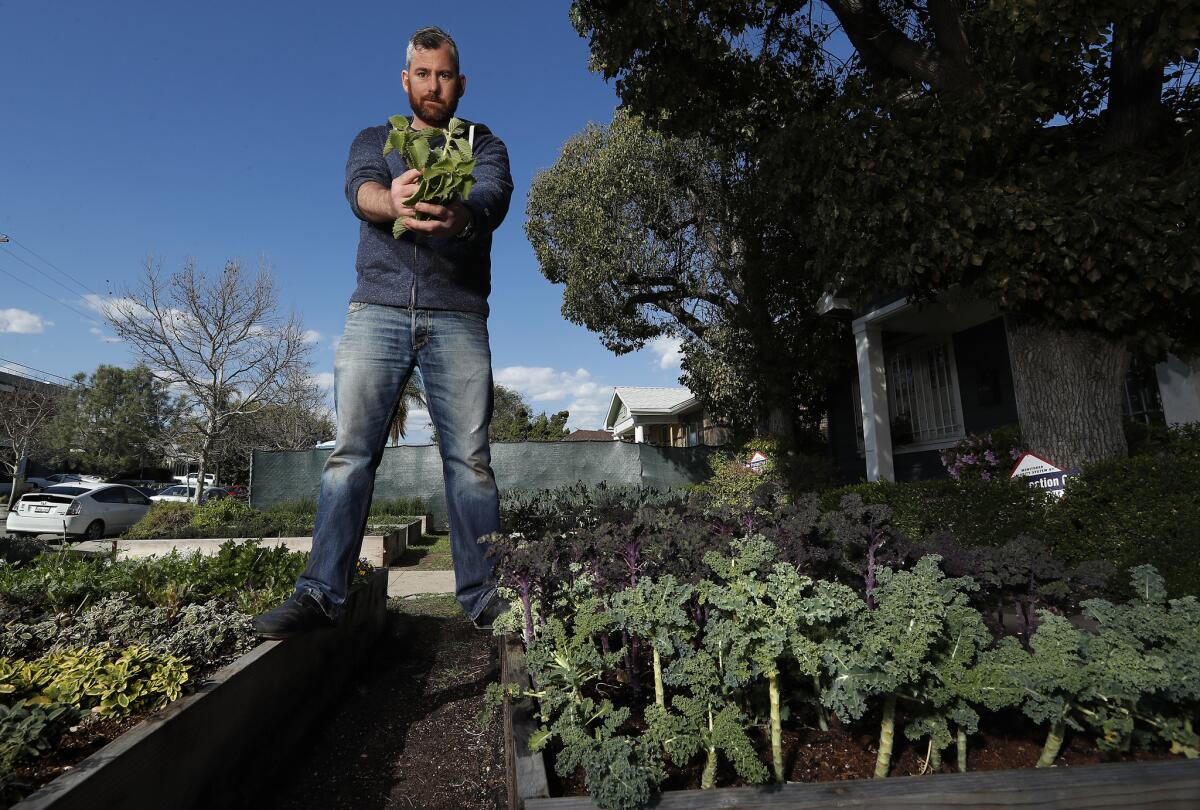
- Share via
“We’re a farm-to-table restaurant.”
Sound familiar? These words are part of the repertoire of greetings uttered by countless servers in Los Angeles and beyond.
If you’ve been paying attention, the term farm-to-table, which refers to the idea of showcasing farm produce on your menu — and was coined by this paper’s own restaurant critic Jonathan Gold in a 2000 Gourmet article — is nothing new. In fact, it’s been used to describe just about every notable restaurant opening in the last decade.
Garden-on-the-neighbor’s-front-lawn-to-table? Now that’s something a little different.
After operating a roaming pop-up dinner party series called Kali Dining, chef Kevin Meehan, who grew up in Long Island, N.Y., and has cooked at the Los Angeles restaurants L’Orangerie, Bastide and Citrine, opened Kali restaurant on Melrose Avenue in 2016. A little more than a year ago, he started knocking on the doors of the squat Craftsman houses that surround the Larchmont restaurant, determined to find a neighbor who would let him grow a garden on their front lawn.
“I decided to get weird,” says Meehan on a recent afternoon, dressed in crisp chef’s whites and a blue apron. “It’s my dream as a chef to have a farm like Blue Hill at Stone Barns, but that’s not going to happen in L.A. So I knocked on this one door and asked if I could beautify the front yard with a garden. The guy who answered was like, ‘Nah, not interested, weirdo.’ So I kept going.”
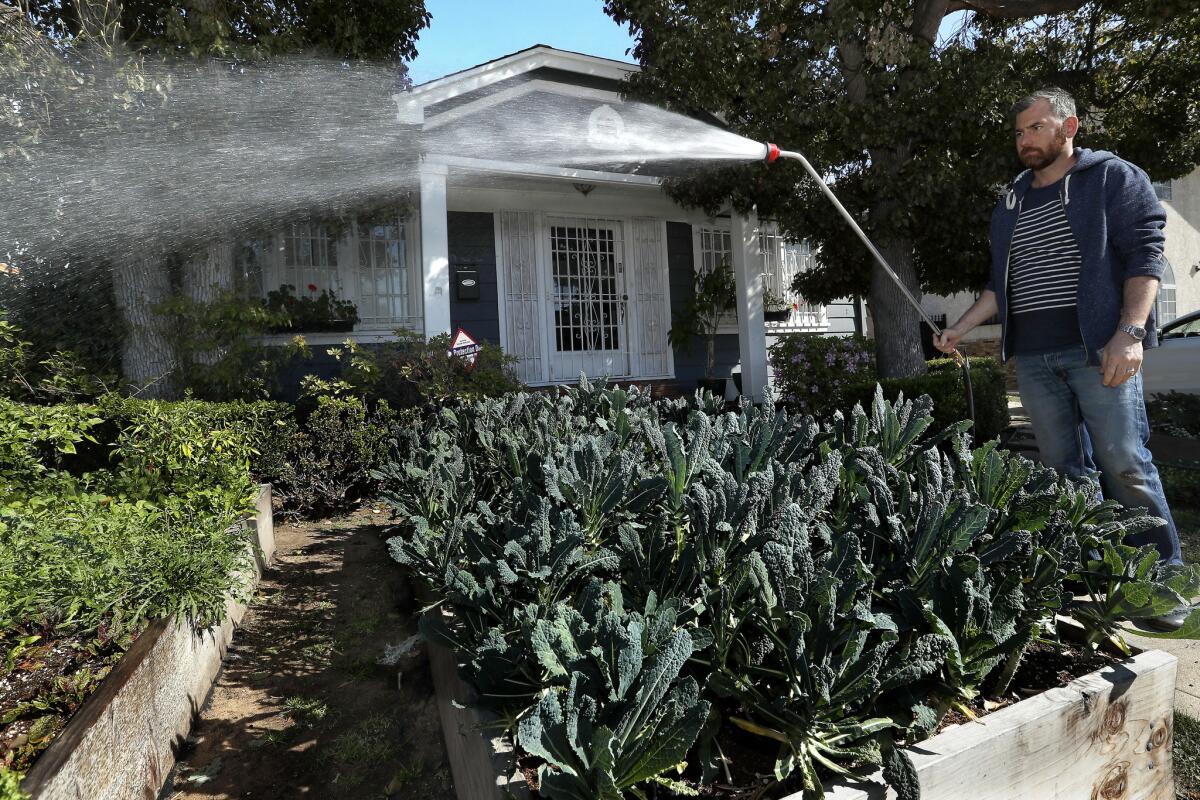
Meehan’s luck changed on his sixth try, when he came to a dark gray, single-story house with white trim, bars on the windows and a white Mercedes in the driveway. “The guy who owns it just said, ‘Hell yeah,’” says Meehan. “He wants no money. He won’t even take money for the water. So I beautified his front yard. Boom.”
What was a square lawn covered in drought-ridden grass is now a sprawling grid of nine 12-foot by 3-foot garden beds made of beautiful California redwood, collectively filled with about $1,500-worth of soil. It’s like a small oasis, smack dab in the middle of the block.
Rosemary sprigs threaten to overtake one of the beds while red sorrel, mustard frills and arugula fill another. Oregano and Cuban oregano grow next to each other alongside a patch of salad burnet. The box full of dinosaur kale looks like it could supply bowls of salad at the restaurant for weeks. There’s a section full of thyme, and just across a small walkway: sage, parsley and nasturtiums. And this is just the beginning.
And all that produce accentuates just about every dish on the menu: kale salad with crème fraîche; charred Hass avocado surrounded by garden greens; a burrata salad studded with mustard frills; yellowtail crudo zapped with peppery nasturtiums; cavatelli pasta served in a ring of crispy arugula.
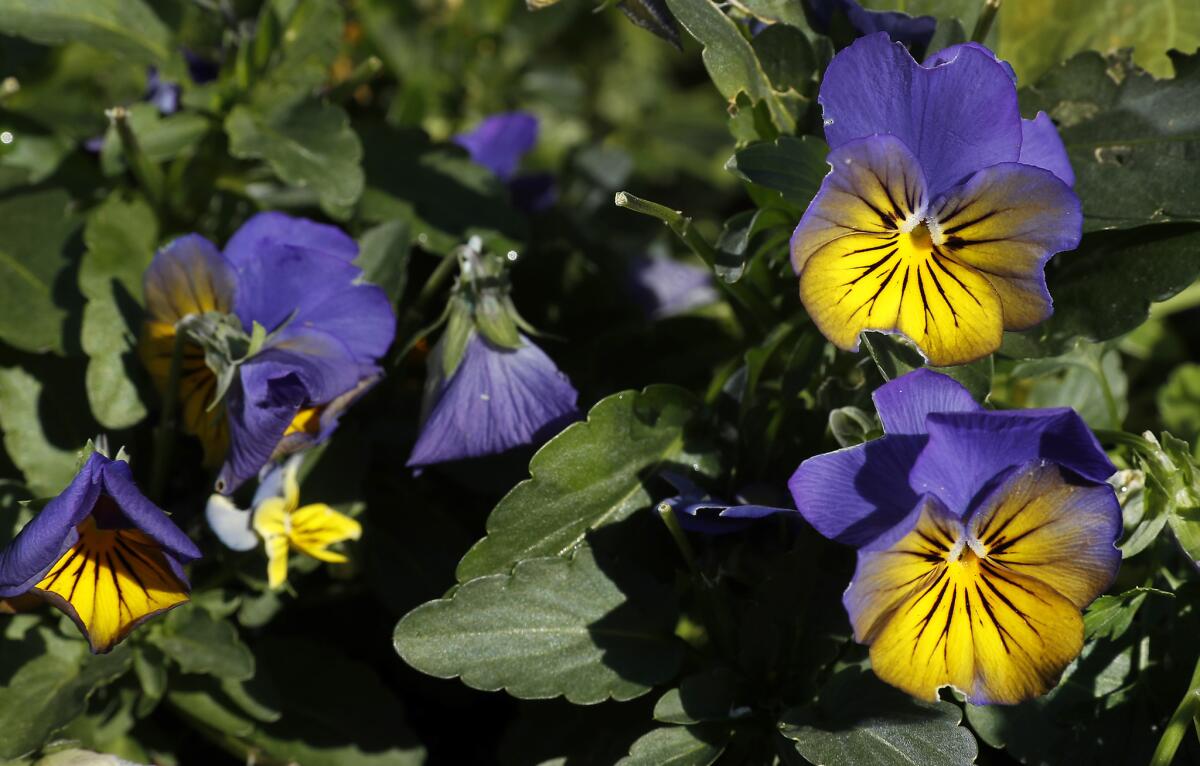
Meehan gets what he plants from Jimmy Williams and his son Logan, who together run Logan’s Garden. The father-and-son duo sell plants and fertilizer mix at the Sunday Hollywood and Wednesday Santa Monica farmers markets. They advise Meehan on the garden, encourage certain plants and give him tips on how to keep them thriving.
“I worked out this deal with them so they give me everything for free and we do a food trade,” says Meehan. “They come in once a week for dinner and a bottle of wine and they give me $400 worth of stuff to plant.”
In addition to venturing out into the neighborhood, Meehan asked the woman who runs a book binding shop next to the restaurant if he could put a garden bed outside her back door. The shop’s owner, Charlene Matthews, said yes, and this is where Meehan mostly grows herbs and some arugula, in a single garden bed just steps from the restaurant.
“It’s nice because it looks really good and I guess I steal a bit of arugula,” says Matthews. “I was happy when they said they wanted to put the garden bed in. There should be gardens like this in more places.”
Meehan’s plan is to take over more front yards in the neighborhood, and he says he’s not opposed to foraging in the area, deriving inspiration from his surroundings.
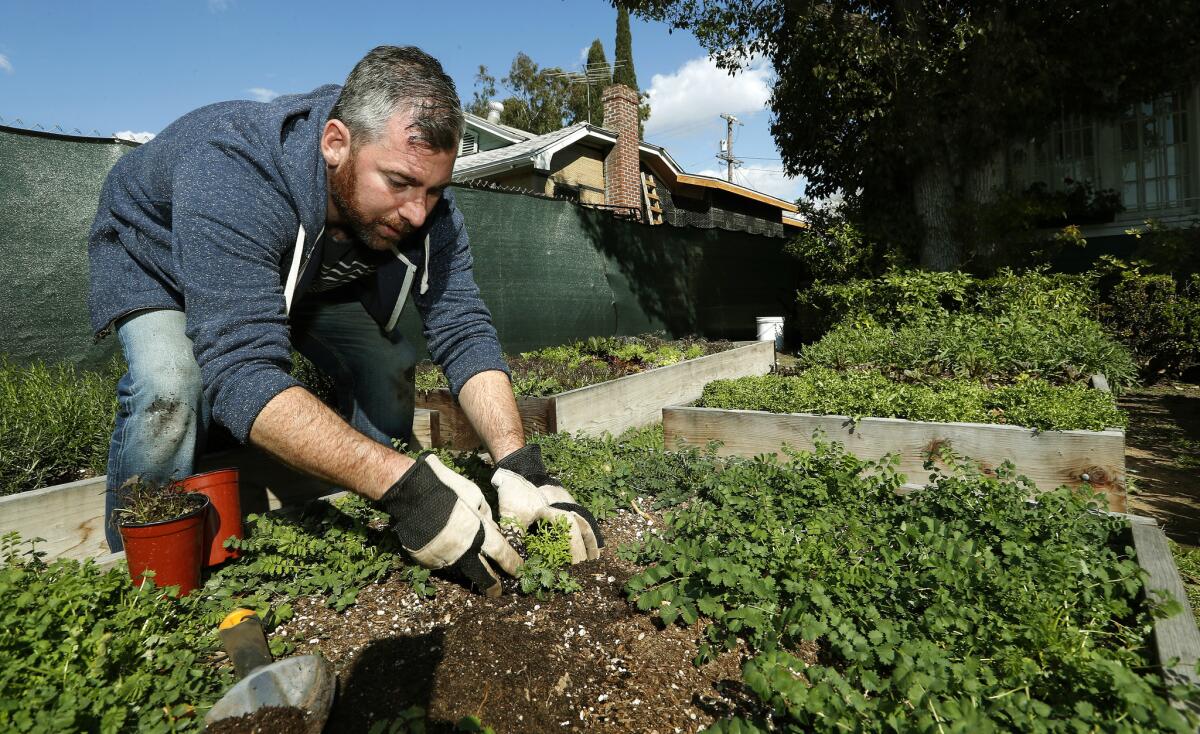
“I look at my commute from Culver City as one supermarket that’s just waiting to get tapped into,” says Meehan as he points out a lemon tree in a neighbor’s backyard. “I tell my chefs when they park their cars to keep a lookout.”
In the two years he’s been in this location, Meehan has picked lemons from that neighbor, loquats from another nearby house, cactus fruit from the house directly behind the restaurant — he uses it to make sorbet — and pink peppercorns from a nearby tree.
“I constantly put feelers out there on social media to see if people have fruit trees,” says Meehan. “I tell them to bring them through, even if they aren’t perfect, because we can make jams — and we’ll hook them up with a free meal.”
You could say the garden is a fluid extension of the chef’s obsession with getting to the root of things — the building blocks that form his every dish.
A walk through the chef’s kitchen reveals no less than 10 slow cookers full of black garlic, some of which have been fermenting for weeks. He’ll turn that garlic into his own umami powder, which he uses to season dishes, dust plates of crudo and coat his fried chicken sandwiches. In the back of the kitchen, Meehan makes his own butter. He uses the buttermilk to make his own crème fraîche and bread. Jars of pickles line one wall of the small kitchen. And he makes his own yogurt too.
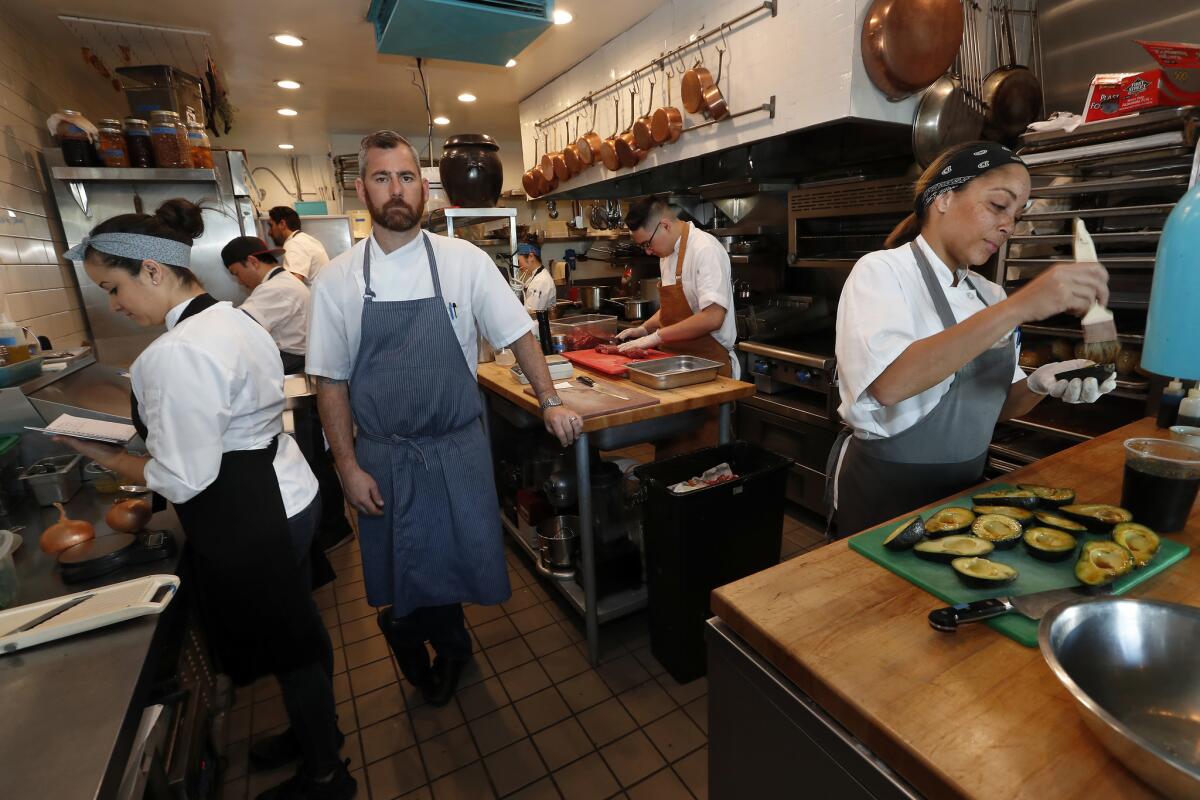
Back in the garden, Meehan places a pizza box on the dirt next to one of the beds, kneels down on top of it, rolls up his sleeves, and prepares to switch out some of the lettuces.
Meehan persuaded another neighbor to let him use his front lawn. And at some point, he’s hoping all the neighbors will say yes.
“There are so many benefits to this, and it helps me keep my cooks engaged and happy,” says Meehan. “There’s a real connection to the food and you don’t want to waste anything because you can see what it took to grow it.”
On his way back to the restaurant from the garden, Meehan spies a man a few houses down, who is out front watering his lawn. The chef quickly rushes over to him.
“Want to get weird?” Meehan asks.
Local chefs with dedicated gardens
Nyesha Arrington of Native restaurant in Santa Monica works with the Cook’s Garden on Abbot Kinney Boulevard in Venice. Gardener Geri Miller turned a vacant lot into the garden in 2013, and runs it with her team from Home Grown Edible Landscapes. Arrington is currently getting nasturtium and passion fruit from the garden. The Cook’s Garden also works with Antonia Lofaso of Scopa Italian Roots, the Tasting Kitchen, Tender Greens, Wes Avila of Guerrilla Tacos, Michael Fiorelli of Love & Salt and Bruce Kalman of Union Restaurant.
Tony Esnault of Church & State and Spring restaurants, both in downtown L.A., works with the Community Garden on Industrial Street in the Arts District, located between Mateo and Mill streets. Residents of the Biscuit Lofts, where Church & State is located, launched the small garden (four garden beds) in 2009. Esnault’s mother-in-law Shamsi Katebi maintains Esnault’s two beds in the garden, as well as some planter boxes outside the restaurant’s kitchen door. She also grows herbs in the flower pots that surround the restaurant’s patio. At the community garden, Katebi is growing kale, Swiss chard, fennel, nasturtium, borage, lemon verbena, parsley, basil and cilantro. And in the planter boxes, she’s growing herbs and edible flowers.
Gary Menes of Le Comptoir in Koreatown turned the front, back and side yards at his mother’s Long Beach house into a garden last year. He grows everything in 1- and 5-gallon pots using compost and organic fertilizer. Menes says he purchases most of his seeds from Bakers Creek in Missouri, and is currently growing a market’s-worth of produce including cipollini onions, four kinds of radishes, sprouting broccoli, two kinds of cauliflower, fava beans, English peas, potatoes, eggplant, garlic chives and more.
Timothy Hollingsworth of Otium in downtown L.A. worked with LA Urban Farms to plant a garden on the rooftop of his restaurant a couple of weeks before it opened in late 2015. There are 24 vertical pods on the rooftop used to grow sage, lettuce, kale, fennel fronds, borage, arugula, mustard frills, mustard greens and more. The restaurant chefs maintain the garden on a daily basis but the pods are on an automated system that waters the plants. And a team from LA Urban Farms comes out to check on the garden weekly.
Niki Nakayama of n/naka and her wife and sous chef Carole Lida-Nakayama planted a garden at their home in Los Angeles in 2006. Farmscape, an Eagle Rock-based company that helps manage gardens, maintains the garden, which grows on the front yard of the house. The Nakayamas grow Japanese vegetables including cucumbers, eggplant and herbs such as shiso for the restaurant.
Fernando Darin at Ray’s & Stark Bar at LACMA recently rearranged the onsite garden, which was started at the restaurant in 2014. In the seven raised beds, Darin is growing arugula, mustard greens, sorrel, cilantro and edible flowers. The restaurant also has a compost program that turns organic food waste into soil used in the garden.
Arthur Gonzalez of Roe Seafood and Panxa Cocina works with Sasha Kanno, owner and operator of Farm Lot 59 in Long Beach to grow produce for his restaurants. Kanno created the 6-acre farm in 2010. She and Gonzalez are currently growing fennel, carrots, huacatay, lavender, kale, serrano peppers, jalapeño peppers and tomatoes for the restaurants.
More to Read
Eat your way across L.A.
Get our weekly Tasting Notes newsletter for reviews, news and more.
You may occasionally receive promotional content from the Los Angeles Times.











